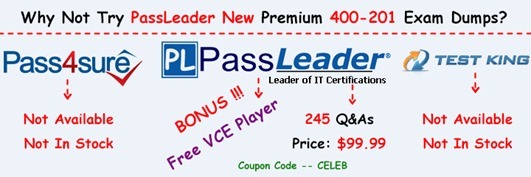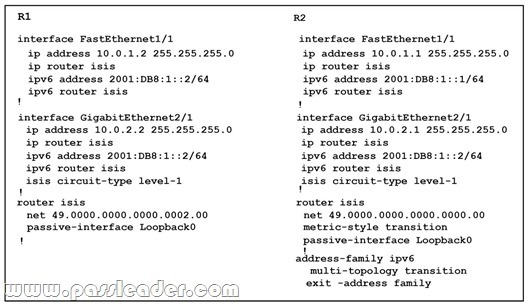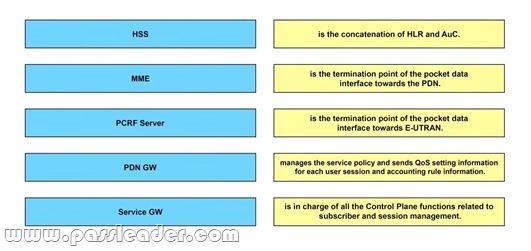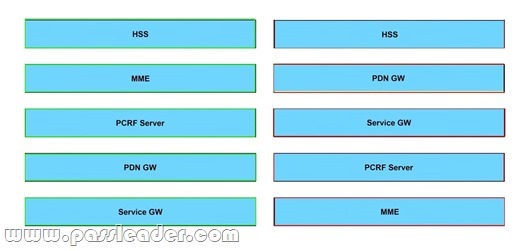[Pass Ensure VCE Dumps] Newest 400-201 Exam Questions Ensure 100% Exam Passing From PassLeader (1-20)
PassLeader's 245q 400-201 vce dumps and pdf dumps help passing 400-201 exam! PassLeader nowadays provide the new version 400-201 exam questions with vce and pdf for free download, the latest 400-201 study guide and practice test tell you all details about exam 400-201, you can acquire the 400-201 certification easily by learning PassLeader's 245q 400-201 premium vce file and pdf dumps. Now visit passleader.com and download free 400-201 exam dumps and you will pass 400-201 exam the other day. keywords: 400-201 exam,245q 400-201 exam dumps,245q 400-201 exam questions,400-201 pdf dumps,400-201 practice test,400-201 vce dumps,400-201 study guide,400-201 braindumps,Cisco CCIE Service Provider Written Exam v4.0/v4.1 
QUESTION 1
When will the primary processor core dump run in case of a switchover? A. never takes place
B. periodically
C. during switchover
D. after switchover
E. before switchover Answer: D
Explanation:
In networking devices with redundant processors, the Post-Switchover Core Dump feature uses better software communication techniques between redundant processors to allow the switchover to occur before dumping core information. Not having to wait for dump operations effectively decreases the switchover time between processors.
The newly active primary processor runs the core dump operation after switchover
http://www.cisco.com/en/US/docs/ios/12_0st/12_0st18/feature/guide/coredump.html QUESTION 2
A company plans to secure its connectivity over its provider. Which method can reduce overhead and provide encryption for Layer 2 over the provider cloud? A. MACsec
B. IPsec
C. L2VPN with 802.1X extensions
D. L2TPv3 Answer: A QUESTION 3
What statement about Transit AS is true? A. Traffic and prefixes originating from Transit AS are carried across a Stub AS to their Source AS.
B. None of the above.
C. Traffic and prefixes originating from Source AS are carried across a Transit AS to reach their destination AS.
D. Traffic and prefixes originating from Transit AS are carried across a Stub AS to their destination AS. Answer: C QUESTION 4
Due to recent acquisitions, a company's MPLS infrastructure is growing very quickly. Concerns arise about labeling each and every IP address on the P router. Which command would significantly reduce the label allocations without compromising LDP functionalities? A. ip prefix-list List1 deny prefix/prefix_length
!
mpls ldp label
allocate global prefix-list List1
B. mpls ldp label
allocate global host-routes
C. access-list 1 permit subnet wildcard
mpls ldp neighbor neighbor_ip labels accept 3
D. mpls ldp password required for 10
!
access-list 10 permit host_ip_1
access-list 10 permit host_ip_2
access-list 10 permit host_ip_n Answer: A QUESTION 5
Refer to the exhibit. When a traceroute is performed from a PC behind R2, the next hop on R1 for IPv4 is 10.0.1.2, and for IPv6 it is 2001:DB8:2:2. What is causing thus behavior?
 A. GigabitEthernet2/1 has a Level 1-only adjacency.
This causes it to be the preferred path for the IPv6 packets.
B. When SPF ran on R2, it calculated two equal paths to R1.
It was a coincidence that than the packets choose different paths.
C. Multitopology is enabled on R2, which causes the IPv6 packets to use a different path than the IPv4 packets.
D. 2001:DB8:2::2 is on a Gigabit Ethernet interface.
Because its speed is higher than Fast Ethernet, the IS-IS metric is preferred. Answer: C QUESTION 6
What are two advantages of Cisco IOS XR Software over Cisco IOS Software? (Choose two.) A. a configuration that is grouped by interface
B. a configuration that is grouped by process
C. one-stage configuration
D. a monolithic OS
E. a two-stage configuration Answer: BE QUESTION 7
An IS-IS enabled router with multiple IS-IS neighbors is required to have BFD sessions with all neighbors. Which BDF mode should you use when you want to save the overhead of periodic protocol control packets? A. echo
B. asynchronous
C. demand
D. active Answer: C QUESTION 8
Drag and Drop Questions
Drag and drop Evolved Packet Core functional entities on the left to the correct description on the right.
 Answer:
 QUESTION 9
A network engineer wants to decrease the convergence time of a network that is running integrated IS-IS as an IGP, at the expense of bandwidth and CPU usage. Which two configuration tasks achieve this goal? (Choose two.) A. Configure the hold time to be 1 second.
B. Configure the hello interval to be minimal.
C. Ensure that hello-padding is disabled.
D. Ensure that the hello multiplier is set to 3.
E. Configure the hello multiplier to be 3. Answer: BD QUESTION 10
Which are two major changes SyncE offers over traditional Ethernet to make it suitable for clock distribution? (Choose two.) A. SyncE introduces the concept of "Boundary Clocks" and "Transparent Clocks" improving network scalability and accuracy of clock synchronization.
B. Industry standard that guarantee interoperability, since granular details, such as specific field values are specified.
C. A mandated clock accuracy of 4.6ppm.
D. The ESMC protocol for clock selection, distribution, management, traceability, and failover.
E. High-priority synchronization packets so it can continually adjust its own oscillator. Answer: CD
Explanation:
http://www.cisco.com/c/en/us/support/docs/optical/synchronous-optical-network-sonet/23718-timefaq-23718.html
http://cp.literature.agilent.com/litweb/pdf/5990-4386EN.pdf

http://www.passleader.com/400-201.html QUESTION 11
Which two flexible service mapping features that are used on the ES40 line card can classify traffic into different service instances, in order to consume fewer VLANs? (Choose two.) A. CoS
B. DSCP
C. IP precedence
D. MPLS experimental bit
E. ToS
F. EtherType Answer: AF
Explanation:
http://www.cisco.com/c/en/us/td/docs/routers/7600/install_config/ES40_config_guide/es40_sw_config/es40_chap7.html#pgfId-1500091 QUESTION 12
Which three statements about bidirectional PIM are true? (Choose three) A. Traffic for a bidirectional group flows along the one shared tree and simultaneously utilizes multiple paths in a redundant network topology.
B. It does not require any traffic signaling in the protocol.
C. Membership to a bidirectional group is signaled using explicit Join messages.
D. It maintains source-specific forwarding state.
E. It reduces memory, bandwidth, and CPU requirements. Answer: BCE QUESTION 13
A network architect is tasked to design and deploy multicast in a service provider core. There is a requirement to have two PIM RP routers for PIM-SM distribute mode. What can the network architect do to satisfy this requirement? A. Set two RPs with same priority.
B. Set two RPs, one with high priority and the other with low priority.
C. Set one RP as the main RP and another as a backup RP.
D. Set the RP-BSR method with one high-priority RP and one low-priority RP. Answer: D QUESTION 14
In relation to MPLS Multicast VPN, which three statements about multicast distribution (MDT) groups are true? (Choose three) A. Default MDT groups are used for PIM control traffic, low-bandwidth sources, and flooding of sparse mode traffic.
B. MDTs are built in customer networks.
C. Data MDT groups are used for high-bandwidth sources to reduce replication to uninterested PEs.
D. MDTs are built in provider networks.
E. The number of MDTs depends on PIM modes of MDT groups. Answer: CDE
Explanation:
Tree created by the MVPN configuration. The Default-MDT is used for customer Control Plane and low rate Data Plane traffic. It connects all of the PE routers with MVRFs in a particular MD and one will exist in every MD whether there is any active source in the respective customer network. QUESTION 15
What is the role of Forwarding Equivalence Class (FEC) in MPLS? A. FEC determines how to establish an LSP path.
B. FEC determines how IP packets are forwarded in MPLS LSP.
C. FEC determines how MPLS labels are stacked in LSP.
D. FEC determines how a group of IP packets are mapped to an LSP. Answer: D QUESTION 16
In optical channel transport unit overhead (OTU OH), what are general communication channels 1 and 2 (GCC1/GCC2) used for? A. for trail trace identification
B. as the backward defect indicator
C. to transmit information between OTU termination points
D. to extend command and management functions over several frames
E. General communication channels 1 and 2 (GCC1/GCC2) do not belong to OTU OH Answer: E
Explanation:
OTU overhead: The OTU overhead consists of three bytes for section monitoring (SM), a two-byte general communications channel (GCC0), and two bytes reserved for future international standardization. QUESTION 17
Which option describes the incorrect usage of the Label Distribution method? A. MP-BGP is used for label distribution for VPN customer routes.
B. LDP is primarily used in internal networks of MPLS-VPN providers.
C. MP-BGP is used for label distribution in MPLS Traffic Engineered networks.
D. Directed LDP is used for label distribution in L2-VPN Attachement Circuits. Answer: C QUESTION 18
RIPv2 differs from RIPv1 in which three things? (Choose three). A. it uses multicast address 224.0.0.10, instead of broadcast
B. it uses multicast address 224.0.0.9, instead of broadcast
C. it can use either multicast or broadcast addresses,instead of just broadcast
D. it sends incremental updates,instead of periodic updates
E. it is classless, instead of classfull
F. it supports authentication, and RIPv1 does not Answer: BEF QUESTION 19
Which option propagates SRLG membership information to the network? A. BGP attribute
B. IGP extension
C. RSVP extension
D. LDP extension
E. PIM extension Answer: B QUESTION 20
Which are the three benefits of using the Yang model? (Choose three.) A. Reduce lab footprint
B. Improve access to resources
C. Support interoperability that provides a standard way to model management data
D. Support simplified network management applications
E. Provide a scale virtual lab environment
F. Support programmatic interfaces Answer: CDF
Explanation:
https://tools.ietf.org/html/rfc6020#page-11

http://www.passleader.com/400-201.html
|



